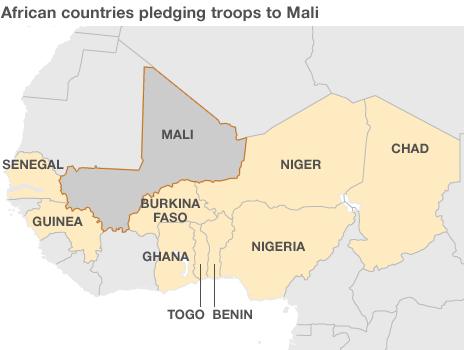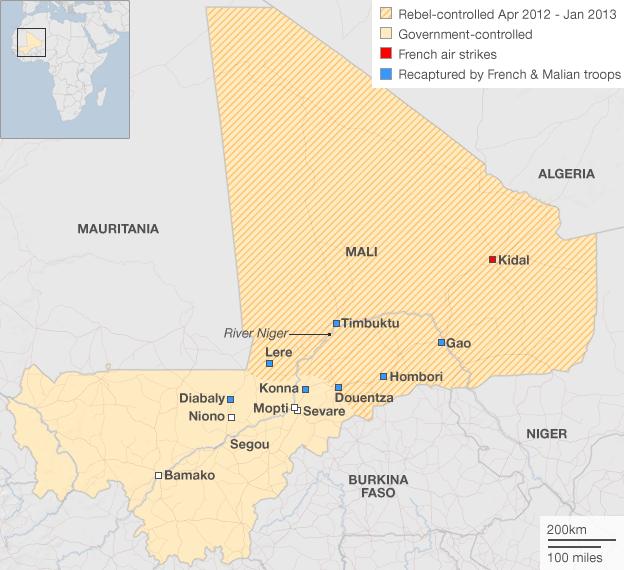Mali conflict: Donor conference raises $455m
- Published
The BBC's Tomas Fessy: "There are mixed feelings of enthusiasm and desire for revenge"
International donors meeting in Ethiopia have pledged $455.53m (£289m) for an international campaign tackling Islamist militants in Mali.
The pledges for aid projects and the African-led Afisma force that is expected to take over from French troops in the country is about half the figure African leaders had requested.
French and Malian troops are securing Timbuktu after seizing it on Monday.
Meanwhile, a Tuareg group says it has control of the northern town of Kidal.
Home to the head of Ansar Dine, the main militant group in northern Mali, it had been the last remaining Islamist stronghold.
'Swift response'
The international donor conference was held in the Ethiopian capital, Addis Ababa.
At the opening of the meeting, Ivory Coast President Alassane Ouattara said the budget for the multinational force's operation would be $950m - more than double the African Union's initial estimate.
Some 60 to 70 donors had been invited to the conference to bolster the funding.
According to a list of donations carried on the AU's Twitter account on Tuesday, Japan pledged $120m, the US $96m and Germany $20m.
India and China pledged $1m each, the AU said, the same as Sierra Leone, which will also contribute 650 troops to the African-led International Support Mission to Mali (Afisma).
The national pledges cover Afisma, humanitarian assistance, logistics, improving security and the future development of Mali.
The chairwoman of the African Union Commission, Nkosazana Dlamini-Zuma, told delegates that they had gathered "to express solidarity with the Republic of Mali and its people".
"We all know the gravity of the crisis. It is a situation that requires a swift and effective international response, for it threatens Mali, the region, the continent and even beyond," she said.
France's Foreign Minister, Laurent Fabius, said impressive progress had been made but that this did not mean the danger was over.
Mr Fabius also said credible elections in Mali would be vital to achieving sustainable peace in the country.
French Foreign Minister Laurent Fabius says rebel groups could still strike in Mali or elsewhere
Ethiopian Prime Minister Hailemariam Desalegn said money would also be needed to fund post-conflict projects.
The BBC's James Copnall, who is in the Ethiopian capital, says there is a general recognition that Mali will not become peaceful again without a democratic transformation, but that for the moment the focus is firmly on finding the money needed by the military force.
On Tuesday, another conference in Brussels is due to decide on which countries will contribute troops for an EU military training mission for Mali.
The UK had already said it would contribute to the training mission and, on Tuesday, the government said around 350 British military personnel would be deployed to Mali and West Africa in a supporting role for French forces.
The UK will also allow allies to operate air refuelling flights from its territory.
'No shots fired'
Life appeared to be returning closer to normal in Timbuktu on Tuesday, with French and Malian troops in control of the streets of the historic city, although electricity and phone lines were still cut and some shops were being looted.

Residents said Islamist fighters had set fire to several buildings, including a library containing priceless manuscripts, some dating back to the 13th Century, before they withdrew into the desert.
The BBC's Thomas Fessy in Timbuktu said he had seen burnt ash on the floor of the Ahmed Baba Institute's library and had been told by staff that some 2,000 manuscripts were missing - either burnt or stolen by the militants. However, another 28,000 had already been moved to the capital, Bamako, for safekeeping, they added.
The recovery of Timbuktu followed the swift capture by French and Malian forces of Gao on Saturday. Gao is now under the control of troops from Chad and Niger.
Fear
With the fall of Gao and Timbuktu, the focus of the French-led troops is turning to the far northern town of Kidal.
However, the secular Tuareg rebel group MNLA said it had already taken control of the town and surrounding areas.
An MNLA spokesman in Paris said that most of the militants had already disappeared by the time their troops arrived in the town on Saturday.
"There was no fighting to recapture Kidal," Ag Assarid told the BBC.
The BBC's Mark Doyle, in Mali, says there is still great fear among the people outside of the main population centres.
No-one is sure where the Islamist fighters have gone, he says, and there are concerns that another phase of the war could now begin - one of hit-and-run attacks or suicide bombings.
